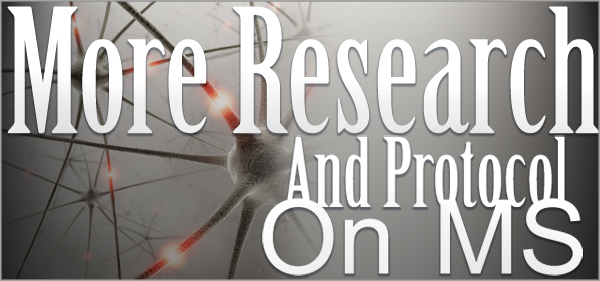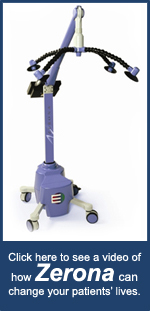
|
|||||||||||||||
May 4, 2009 |
|||||||||||||||
|
The article on MS... caused a great deal of interest. So we are continuing the information with more research and input. This week’s Puzzle Piece is contributed by Dr. Lynn Toohey. Dr. Toohey has researched and published peer-reviewed articles on multiple sclerosis and molecular mimicry, for example: Cordain, L.; Toohey, L.; Smith, M.J.; Hickey, M.S.; Modulation of Immune Function by Dietary Lectins/Proteins in Rheumatoid Arthritis. British Journal of Nutrition April 2000;83:207-217; and Toohey, L. Impact of Dietary Antigens on Multiple Sclerosis. Journal of the British Society for Allergy, Environmental and Nutritional Medicine. June 2005.
Dr Toohey states, “Back in 1997, I wrote a Nutri-Notes on MS and molecular mimicry. This is the theory that foreign proteins (and food can be a foreign protein when not digested) can trigger an autoimmune cross-reactive response that attacks the myelin sheath covering the nerves in the body, initiating multiple sclerosis. (Click here to the sample report of the MS Nutri Notes from eWellnessSystem) If you need to customize the report, sign in for your free month with the directions below at the end of the article. The correlation of MS with Epstein-Barr virus that I referenced from the 1995 “Cell” article is still borne out today, with researchers proclaiming that there is evidence “EBV could break immune tolerance to myelin antigens through molecular mimicry” (Salvetti M, et al. Epstein-Barr virus and multiple sclerosis. Curr Opin Neurol. 2009 Apr 7). The molecular mimicry connection to milk is still considered strong. In the BSAENM article mentioned above, I pointed out that butyrophilin, a milk protein, has demonstrated molecular mimicry with a myelin protein, and also that the bovine serum albumin (BSA) protein in milk evokes molecular mimicry with vitamin D binding protein AND a complement protein in the immune system (Perez-Maceda B, Lopez-Bote JP, Langa C, Bernabeu C. Antibodies to dietary antigens in rheumatoid arthritis--possible molecular mimicry mechanism. Clin Chim Acta 1991; 203:153-165). Newer research confirms that exposure to this common dietary milk antigen, for someone susceptible to MS (there is a strong hereditary component) may influence the composition and function of the autoimmune response against the nerve sheath protein during the course of MS (Guggenmos J, et al. Antibody cross-reactivity between myelin oligodendrocyte glycoprotein and the milk protein butyrophilin in multiple sclerosis. J Immunol. 2004 Jan 1;172(1):661-8). Nutri-West Homocysteine Redux is an important formula for MS patients. The complete regimen will reduce homocysteine, which is toxic and may be causing direct problems, and also facilitate methyl donors (SAM) for neurotransmitter synthesis, nerve sheath regeneration, and synthesis of phostatidylcholine). The Redux formula facilitates the pathway, thereby providing sulfur donation for tissue/cartilage repair, in addition to providing sulfur to the sulfur detox pathway. Metals such as mercury deplete the body of sulfur, and do much of their damage by destroying sulfur amino acids. MS patients are usually low in sulfur, and also suffer more from metal toxicity because it is further draining the much-needed sulfur. This formula helps to provide sulfur, but will not cause the molybdenum deficiency that MSM does (molybdenum is included in the formula). To view a free copy of the molecular mimicry articles, simple use the following links. The Archived Article section from the Help and Resource Center of the eWellnessSystem internet-based program contains these articles. Click here for the arthritis molecular mimicry article and Click here for the MS molecular mimicry article. If you would like to access other areas of the program free for one month, simply sign in with the code NWNW, and you can download fact sheets on all of the above mentioned Nutri-West products, a patient video on leaky gut, the health concern of MS, the MS Nutri-Notes, and much more.” Thanks to Dr Lynn and her associates at eWellness. I know you will enjoy the articles and research made available.
The best to all of YOU from John W Brimhall, DC and the Wellness Team  |
|||||||||||||||
 |
 |
 |
 |
 |

|
Dr. Brimhall's Health Puzzle Piece is a weekly email newsletter distribution that has been brought to you by the collaborative efforts of the Brimhall Wellness Team. All newsletters are published and available at www.BrimhallPuzzlePiece.com a division of Health Path Products, LLC. The above statements have not been evaluated by the
FDA. The nutritional information, suggestions, and research provided are
not intended to diagnose, treat, cure, or prevent disease and should not
be used as a substitute for sound medical advice. Please see your health
care professional in all matters pertaining to your physical health. |


